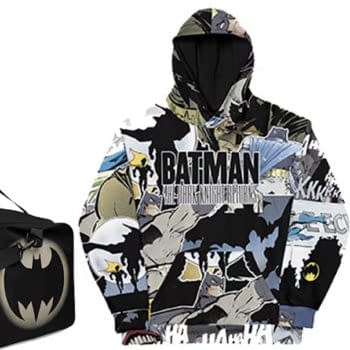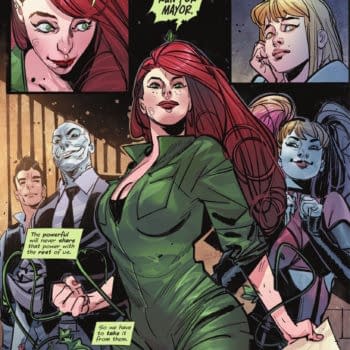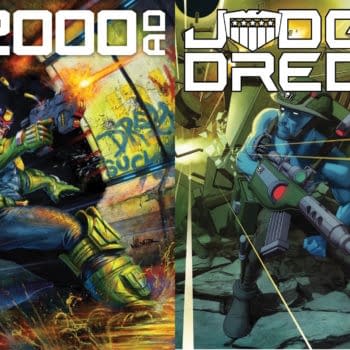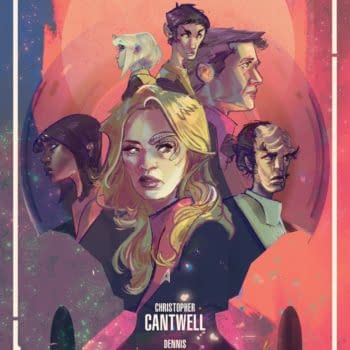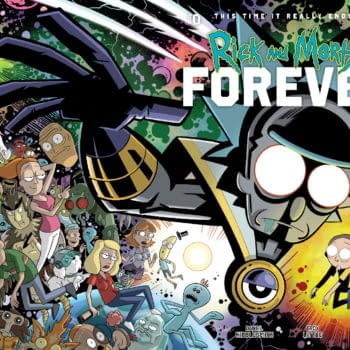Posted in: Comics | Tagged: Comics, fandom, HRL, internet, makeminemilkshake, social media, twitter
The World Of Comics Has A Serious Problem: Trolls
There's something rotten in the world of comics. It's something I've noticed for a very long time, sadly, but the last few weeks has seen it feel even worse. Maybe even the last year, emboldened by the kind of discourse pervading our world now, even down to our politics and societal structures. That problem is, simply put: trolls.
No, not rebirths, retcons, or reboots (or perpetual event comics) — no, the problem with comics has become a frankly toxic element of discourse that has pervaded every section of comics, from fandom, commentary to critical elements — and even the creators and publishers themselves.
Note: I am not going to name names here. This article isn't about playing the shame game, and I will not be calling any particular individual out, but I most certainly will be discussing the kind of harassment and offensive dialogue that has sprung up in comics, or at the very least become far more visible, through the advent of social media.
After all, there has probably always been a negative element. The idea of gatekeepers to the comics community and fandom is hardly new. It's what led to all those offensive stereotypes of comics fans as fat, balding, middle-aged white men living in their mothers' basements — because it was happening. Comics felt inaccessible to minorities, women, and POC for years due to a) a perceived lack of their presence in the material and b) a threatening, unsafe feeling generated in comics spaces, whether through language used or the perceived glares of those admitted into that world.
The why of this, why would they be like this, is largely a simple psychological response: they are made to feel powerless in the world, and unfortunately a natural inclination for humans, a very base response, is to "reclaim" some of that power by passing along those feelings of powerlessness to someone they feel they can — such as individuals or groups new to the area or community, or who are themselves seeking a safe space. Think about that for a second: this is basically the entire discourse of the wider social and political world at the moment too, a behaviour purposefully manipulated on a larger scale outside of the comics community. What we are seeing in comics is perhaps a microcosm of that.
But social media seems to have magnified things to a scale hitherto unseen, and it is perhaps all the more horrifying to see because we are at a time when those women, POC, and minorities are at least being attempted to be brought into the comics community.
After all, social media has done many great things. It has made access to creators, publishers, and the fandom so much easier, and has played roles no doubt in helping some of these newer, more diverse voices from becoming beacons in the community — whether it be at a creative level, critical level, or fandom level.
However, it has also made it easier for those who would dissent to change to find and target those they feel are ruining "their" comics. And certainly of late, we have seen female creators and editors and trans creators and editors face an insane amount of hate, irrational thinking and vile speech — and yet the perpetrators have faced little to no reprimanding.
This is especially true of Twitter, which continues to allow users to harass trans comics creators. A major part of this may be freedom of speech laws, especially in the US, which arguably have not yet caught up to modern technologies. In the majority of cases, while some of the things they are saying are so morally vile and objectionable, they have not broken any of the protections built into the sacrosanct laws of freedom of speech — they have not incited violence or unsafe physical situations (or at least not in a legally provable sense); they have not said anything that would be deemed obscene (they often avoid swearing or crass imagery, though not always); and they do not say anything that could be construed as legally libellous or slanderous.
From this standpoint, Twitter can stand behind a wall of "they have the right to say these things", no matter the moral implications or repercussions. They might try to argue that shutting them all down is not possible, but we know this isn't true. After all, any account that is perceived to have any remotely Nazi content or imagery is banned in Germany…where such things are illegal and would see Twitter getting sued.
But while to some extent comics has always had this problem of toxic environments, let's not forget that old stereotype: such examples were usually socially awkward themselves and would not express these views publicly. Of course, this is another element where technology came into play and changed things.
Because since the advent of the internet, people could anonymously throw out their hatred and bile without fear. It emboldened such voices to finally speak up loudly, and they sure as hell did so. While it may forever be impossible to measure the size of this element of fandom, it can't be denied that this element is loud.
With the advent of social media, this became a more difficult situation, as this element now had access to make their statements not just into the either, but targeted at individuals and groups. They got to see themselves as digital gatekeepers "protecting their community" from the outsiders — instead of welcoming new insights, new fans, and potentially new friends.
This element continues to grow and get bolder too, and this is in large part not due to laws not catching up with new technology — but rather with the publishers and creators themselves not catching up with an ever changing audience and an ever-changing time.
The trolls of the internet probably feel safe in speaking their minds as they do, as the creators they idolise often do the same. There have been a number of creators who have publicly via social media made troll like comments themselves, whether it be making fun of fans who are concerned with the direction of a story or shutting them down for expressing concerns from a different viewpoint; actually threatening critics or calling them idiots or liars because they have a distaste for the site they work for or other writers at that site, or merely didn't like a review or article they wrote; or expressing social or political views that previously they would have kept to themselves. And publishers have been few and far between in any kind of reprimand against this action.
While the ability social media gives fans to feel a greater connection to their favourite creators is one thing, it has also allowed the trolls element to feel safe in their aggressive, threatening messages because they see people in places of "authority" within their community get away with it, too.
Comics, then, has come to accidentally nurture this environment, even when it has worked against them. Even when it leads to movements pushing back against the trolls such as #MakeMineMilkshake, they simply move on to the next group that they perceive as unprotected.
This may be the biggest problem facing comics right now. If the tolls gatekeeping the community persist, it will continue to put off new people from wanting to join the community, even despite the best efforts or creators and publishers. We need to foster an environment where this kind of hatred; this kind of ownership, this kind of moral wasteland can no longer be permissible.
And this really should be done from top down. What needs to be found is a way of turning these examples of bad behaviour into an actual conversation. And I do not mean by the minorities or communities being affected — it is not the job of these groups to educate trolls; they are spending enough time dealing with the fallout and trying to live their lives. Rather, as a community we should not just rally towards showing support, but also towards seeding change — not just of opinions and hearts and minds, but of the nature of the conversation away from an environment of exploitative and reactionary poop-flinging and towards mature, stable, and reasoned conversation that is open to new viewpoints.
We have seen examples again on the wider stage of where the discourse of the world has moved away from healthy debate and education and towards this new paradigm of statements designed to send people into a rage, preventing all reasonable conversation. The reason for such discourse is clear: it's self-serving. You get to hear your own voice and opinion, and then watch the rabble as those it's offended because of the way it was delivered vent and rage — and speaks to the primal element of those who agree with you. It is designed to eliminate reason in favour of the instant gratification of having your own thoughts "validated".
But we cannot allow that to continue. We cannot allow the validation of attacking and hurting minorities, or indeed anyone. We need the comics community to change — and it is all of our responsibility to work on that.
















